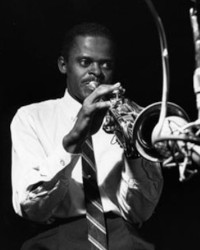
Thomas Walter Turrentine, Jr. was a swing and hard bop trumpeter and composer who was active between the 1940s and the 1960s. He rarely worked as a bandleader, and was known for his work as a sideman with drummer Max Roach and his younger brother, the saxophonist Stanley Turrentine.

Sunny Side Up is an album by jazz saxophonist Lou Donaldson recorded for the Blue Note label and performed by Donaldson with Bill Hardman, Horace Parlan, Sam Jones, Al Harewood, with Laymon Jackson replacing Jones on four tracks.

Midnight Sun is an album by jazz saxophonist Lou Donaldson, recorded for the Blue Note label in 1960, but not released until 1980 and performed by Donaldson with pianist Horace Parlan, bassist George Tucker, drummer Al Harewood and congalero Ray Barretto.
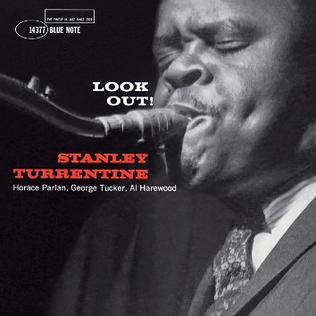
Look Out! is an album by jazz saxophonist Stanley Turrentine featuring his earliest recordings as a leader on the Blue Note label performed by Turrentine with Horace Parlan, George Tucker and Al Harewood.
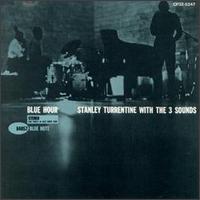
Blue Hour is a collaboration album by jazz saxophonist Stanley Turrentine and The Three Sounds recorded for the Blue Note label and performed by Turrentine with Gene Harris, Andrew Simpkins and Bill Dowdy. The album was reissued in 2000 with an additional disc of unreleased recordings, as Blue Hour: The Complete Sessions.
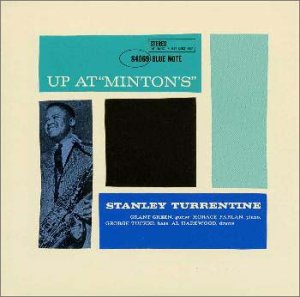
Up at "Minton's", Vols. 1 & 2 are a pair of separate but related live albums by American jazz saxophonist Stanley Turrentine recorded on February 23, 1961 and released on Blue Note later that year. The quintet features rhythm section Grant Green, Horace Parlan, George Tucker, and Al Harewood. The album was later as a double CD set.

Jubilee Shout!!! is an album by jazz saxophonist Stanley Turrentine, recorded for the Blue Note label in 1962, but not released until 1986. The selection was originally included on the double LP Jubilee Shouts, together with some tracks later appeared as Comin' Your Way. Said LP, however, omitted some tracks which may be found on the CD editions of both albums.

Never Let Me Go is the eighth album by jazz saxophonist Stanley Turrentine recorded for the Blue Note label and performed by Turrentine with Shirley Scott, Major Holley, Ray Barretto and Al Harewood, with Sam Jones and Clarence Johnston replacing Holley, Barretto and Harewood on two tracks.
Al Harewood was an American jazz drummer and teacher, born in Brooklyn. As a musician Harewood worked with many jazz musicians including the J.J. Johnson/Kai Winding group, the Art Farmer/Gigi Grice band, David Amram, Betty Carter, and the Curtis Fuller-Benny Golson Sextet. He played on many jazz recordings under the leadership of Lou Donaldson, Horace Parlan, Ike Quebec, Dexter Gordon and Grant Green and had a long association with saxophonist Stanley Turrentine from 1959 onwards.

Easy Walker is an album by jazz saxophonist Stanley Turrentine recorded for the Blue Note label in 1966 and performed by Turrentine with McCoy Tyner, Bob Cranshaw and Mickey Roker. One additional track from an unreleased session arranged by Duke Pearson was added to the original CD release and another four bonus tracks recorded in 1969 and originally released on Ain't No Way were added to the 1997 CD reissue.

The Look of Love is an album by jazz saxophonist Stanley Turrentine recorded for the Blue Note label in 1968 and arranged by Duke Pearson and Thad Jones.
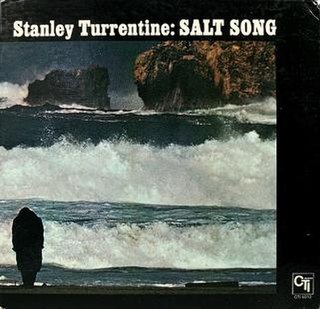
Salt Song is an album by jazz saxophonist Stanley Turrentine recorded for the CTI Note label featuring performances by Turrentine with an orchestra arranged by Eumir Deodato. The CD rerelease added another track.

Us Three is an album by American jazz pianist Horace Parlan featuring performances recorded and released on the Blue Note label in 1960.
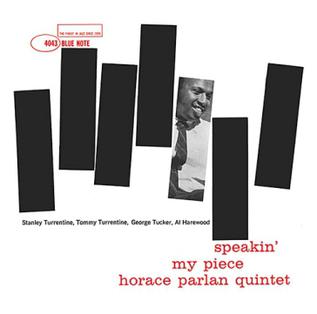
Speakin' My Piece is an album by American jazz pianist Horace Parlan and his quintet, recorded and released on the Blue Note label in 1960.

Headin' South is an album by American jazz pianist Horace Parlan featuring performances recorded in 1960 and released on the Blue Note label.

On the Spur of the Moment is an album by American jazz pianist Horace Parlan featuring performances recorded and released on the Blue Note label in 1961.

Up & Down is an album by American jazz pianist Horace Parlan featuring performances recorded in 1961 and released on the Blue Note label.

Doin' Allright is an album by American jazz saxophonist Dexter Gordon recorded in 1961 and released on the Blue Note label.
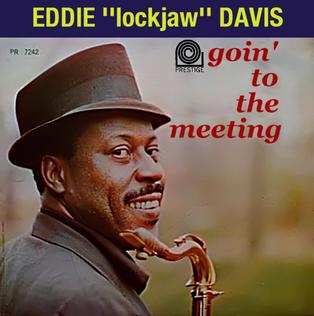
Goin' to the Meeting is an album by saxophonist Eddie "Lockjaw" Davis recorded in 1962 for the Prestige label.

More than a Mood is an album by American jazz saxophonist Stanley Turrentine recorded in 1992 and released by the MusicMasters label.



















